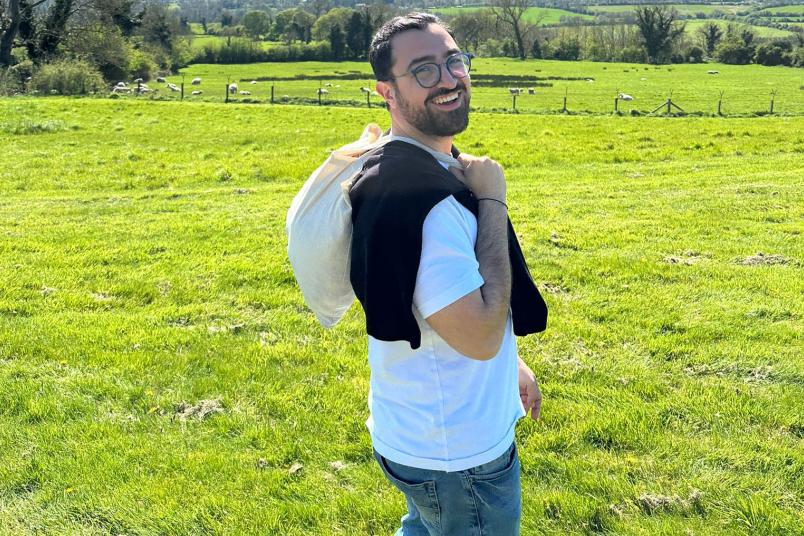
NOHA Program Omar Samawi studies Humanitarian Aid
Born in Jordan, he would one day like to establish his own non-governmental organization in the Global South.
At the beginning of the 1990s, the "Institut für Friedenssicherungsrecht und Humanitäres Völkerrecht (IFHV)" had the idea of developing a degree course in International Humanitarian Aid that would combine academic expertise with a high degree of practical relevance and thus promote the professionalization of the field. Thanks to the Ruhr University's good international contacts, a consortium of European universities came together in 1993 and founded NOHA – the Network on Humanitarian Action, with the aim of promoting professional (training) education and research on humanitarian crises. The Master's program is now funded by Erasmus Mundus. We spoke to one of the current students. Omar Samawi completed his first semester in Bochum and is now studying in Dublin.
Why did you choose NOHA? And why did you choose Bochum as your first place of study?
Well, several factors have led me to believe that NOHA is the right program for myself. As you might know, Logistics is one pillar of Humanitarian Action. Prior to pursuing my masters, I was specialised in Pharma Logistics: shipping medicine to all types of challenging situations. My experience working at the Ministry of Health (MOH) in Jordan planning the COVID-19 vaccine deployment program during the pandemic, truly inspired me to gain a more holistic view on the Humanitarian System: something that the NOHA program excels in doing.

I would like to go back and get a piece of that humanitarian action!
From another perspective, Jordan is a country that is welcoming more than 3.7 million refugees (around 40% of population) from 49 different countries. I would like to go back and resettle in Jordan, the knowledge i am gaining from NOHA can help me give back further to my country of origin. Or in more youthful terms: I would like to go back and get a piece of that humanitarian action!
Regarding Bochum, Germany is my second home, and it makes perfect sense that you start your program in a country you are familiar with. NOHA (or Erasmus Mundus in general) are very exciting programs, but they can be stressful. It is smart to reduce the variables in the first semester by starting in an area you are familiar with and comfortable in.
You are now in Dublin. What do you think is the biggest difference between the two cities?
While those two cities are in the same part of the world, there is a vast difference between them. Mentality, lifestyle, cost of living, language, political opinions and attitude towards life are some of the differences ... I would say the only two things that these two cities have in common is good beer and bad weather, haha!
While I cannot point out one major difference, I can only say that both cities have a lot to offer, and if I have not lived nine years in Germany already, I would be equally awed by Bochum as I was in my short exchange in Ireland.

How can local organisations internationalize?
Do you already have concrete plans for the time after the study program?
As I said before, I would be happy to return and give back to my country of origin, Jordan. Other than working for the MOH, I already have over two years of working experience in a local NGO in Jordan. It was a very insightful, but also a very challenging experience, due to the limited resources local NGOs have, and the pressure that arises from that.
One main topic in the Humanitarian field is decolonisation, which is encouraging international NGOs into becoming more localised. The NOHA program could help me reach out to international bodies, which in return could perhaps support me find more leading positions in Jordan. I personally would love to establish my own local NGO with international support.
A big question is how international NGOs can localize (a top down approach). In fact, for my thesis dissertation, I am very much interested in inverting the question, and ask: How can local organisations internationalize? I hope that one day I can establish an NGO in the global south, that grows and one day have a global reach.

I look forward to a stronger Europe, diverse in its people, politics and opinions.
So, as a native Jordanian, how do you perceive the EU and the upcoming European elections?
One of the most fascinating aspects of the EU is the diversity among this relatively small continent. Not only does the European election bolster the unity and image of the EU, but it can also bring comfort and the feeling of safety towards its citizens, especially among those that do not particularly agree with current politics of their own countries.
I moved to Ireland in early 2024, during a very tough and very charged political time. Ireland's history that included a horrible famine and being harshly colonised made them strive to always stand against injustice. Humanitarian Action is engraved in their culture and their politics. As a European of Jordanian origins, I felt so relieved to see Ireland's compassion with the Palestinian people. It made me appreciate Europe's political diversity, and made me feel that I am heard. I look forward to a stronger Europe, diverse in its people, politics and opinions.